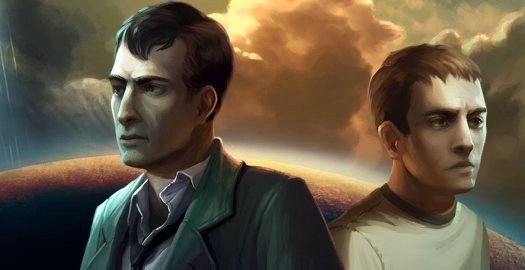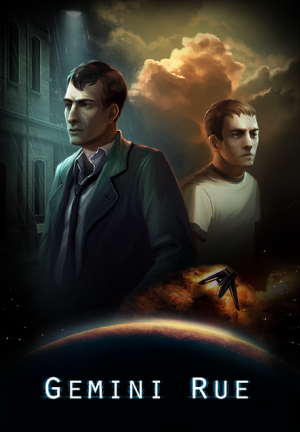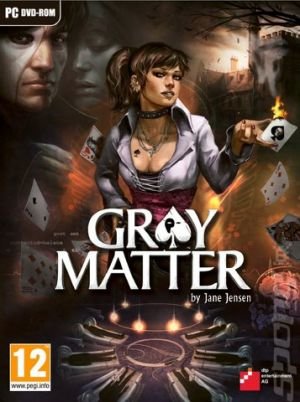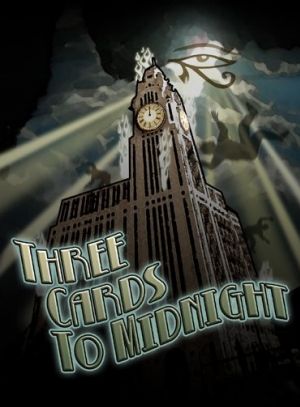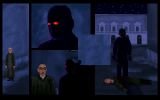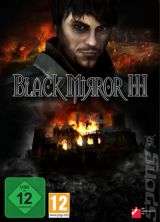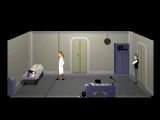Review for Gemini Rue
Game information
Adventure Gamers Awards
The story of Gemini Rue's rise to prominence is a true feel-good story in the adventure genre. Developed almost solely by UCLA Media Arts student Joshua Nuernberger over a period of two years, the game (then called Boryokudan Rue before a well-advised name change) was the Student Showcase Winner at the 2010 Independent Games Festival, eventually leading to a publishing agreement with well-respected indie developer and publisher Wadjet Eye Games. Full voice-acting was added, and Gemini Rue is now a full-fledged retro commercial adventure, and an outstanding one at that.
The story that takes place within Gemini Rue is not nearly so feel-good. It is the bleak story of two tortured souls in a neo-noir future: Azriel Odin, a rogue police officer with a dark past searching for a close friend who has disappeared; and Delta-Six, a resident of the mysterious Center 7 facility who, as part of a rehabilitation process, has had his memory wiped and is undergoing weapons training. Azriel's journey takes him to the dark city of Pittsburg on the planet Barracus, where an epidemic of drug usage has been unleashed by the mafia-like Boryokudan. Delta-Six's journey takes him through his daily routine in the rehab facility, where he attempts to piece together his wiped memories and determine who his true friends are. While seemingly disconnected at first, their stories and fates collide in dramatic and dark fashion in the game's final hours.
Athough Gemini Rue has many positive qualities, it is its sinister and memorable storytelling that sets the game apart as an exceptional independent adventure. Azriel's story takes the first hour or so of the game; Delta-Six then takes over for an hour. At this point, both stories proceed in parallel, and the player is free to switch between the two at any time, whether for reason of variety or just plain being stuck. At about the 5-hour mark, the stories of the dual heroes converge and the game plunges breathlessly into an exceptional and memorable third act. All told, the game provides 7-8 hours of solid playtime, barely a minute of which is wasted time.
I can quantify that with a great deal of certainty for a simple reason: Gemini Rue is a very, very easy game. It feels in many ways like some great Interactive Fiction works such as Photopia that are generally classified as being "on rails" and devoid of any puzzles that could disrupt the progress of storytelling. This game is not quite at that level; there is a lot of walking around in the relatively confined space of the two stories, and there are many challenges that could be described as puzzles, including quite a bit of research by Azriel on the planet computer terminals, but there is no inventory combination and never more than four items carried at once.
Obstacles are almost always a matter of common sense and designed so that solutions are visually obvious. Sometimes the most inelegant solutions are the most sensible ones—windows can be kicked in, locks can be shot off, and boxes can be moved to provide a boost. The immediate goal is always very obvious if one pays attention to text, or when it becomes necessary, trial and error through dialogue trees always proves successful. This is a textbook example of an adventure game that proceeds like reading a great novel, without getting tripped up in overwrought puzzles. Still, the almost total absence of challenge will prove unfortunate to those who feel rewarded after cracking a complex puzzle.
Much hand-wringing will surely take place over the threat of gunfighting action sequences, but I would like to dispose of such chatter with little more than a yawn, which is about the amount of effort I needed to complete these shootouts. I believe I counted five such sequences in the entire game, and none felt out of place. The sequences consist of moving between three positions (call them left exposed, protected, and right exposed) with the A-S-D keys and firing when your enemy moves into the matching position on their side. These events are short, painless, simple, and require a bare minimum of reflexes.
If that's not enough, there's even an Easy setting, and the game autosaves before each action sequence so that no time is wasted if you don't initially survive. I found them so brief and easy that I thought I should replay them on Medium for the review's sake--and was shocked to find that I was already on that setting. Rather than leaving any lasting negative impact on me, I actually found it pleasant to have at least a bit of intensity in the midst of multiple men trying to kill me instead of a silly resolution like just using the gun as a normal inventory item to fire at bad guys. To equate these harmless sequences with something much more difficult (Full Throttle's road battles come to mind) would be a big mistake that would keep you from a great experience.
Although not picked up by Wadjet Eye until near its completion, Gemini Rue feels like a standard-bearer for the publisher's independent retro adventure aesthetic. It looks, sounds, and plays like a typical Golden Age adventure. Some will surely be confused by the appeal of "lo-res" 320x200 backgrounds, but those who remember when games looked like this will be right at home. Even by retro standards, this is not a pretty game, with deliberate overuse of bland and dark colors in Pittsburg, where almost all locations are either dark and gritty outdoor streets or the bland interior of a run-down apartment complex; and sterile white uniformity on Center 7. However, it is animated exceptionally well (the rain effects are very impressive) and the space travel cutscenes look far better than what most developers have done with the Adventure Game Studio engine used here. The similarly retro-styled interface calls for right-clicking on hotspots and then selecting the appropriate body part (eye, hand, mouth, or foot) or inventory item to use.
The music, composed by Nathan-Allen Pinard, is great--and far too infrequent. Most of Azriel's scenes are completely silent other than the falling rain, a nice ambience that wears a bit thin after a while. There are a few great sci-fi themed background tracks that pipe in seemingly randomly on Center 7, but they disappear just as randomly and too quickly. Voice acting, the primary contribution of Wadjet Eye to the game's production, is generally good, particularly with the main characters. Supporting characters are more hit-and-miss; the big misses, like the villainous Balder, tend to be too demonstrative or have curiously misplaced accents. The game's most frequently heard voice, Azriel Odin, is easily the best and most believable. The actual dialogue writing is never exceptional, but it's also never bloated or inefficient. Characters say enough to tell the story and little else.
One popular (and brilliant) Wadjet Eye staple is also featured: a director's commentary. The commentary option turns on various “nodes” in the form of unnecessarily large icons, which provide general thoughts on the surrounding area, all spoken by Nuernburger, or cast dialogue bloopers (a less appealing aspect). This is unlike the familiar Blackwell feature which pops up commentary at pre-determined times. Although it is obviously not recommended to play the game with this on for the initial playthrough, as it will disrupt the momentum of the storytelling, it provides substantial replay value--possibly the adventure genre's most troublesome weakness—and it is fascinating to learn Nuernburger‘s thought process in various elements of game design. It also provides a callback to another key point of Golden Age adventures: the appeal of having some identification with the personality behind a game. It's not self-serving in the least for a game to be branded with an individual's name; instead it provides a point of human connection, which can only enhance the impact of a story as well-told as this.
And that's really the ideal word to properly describe the experience. This is a story with remarkable impact. The tale of parallel heroes is never saccharine--one, Azriel, is an anti-hero, an assassin with little moral compass and only a desire to locate someone he cares about. This involves both shooting at and, to serve your ends, tenuously joining forces with the Boryokudan mafia, as well as a number of subplots involving the “juice” drug of choice and the effects it has on some supporting characters. The other, Delta-Six, is an amnesiac blank slate with implications of a very dark past, doing all that he knows to do in the midst of some very troubling companions—all of whom have plenty of caution to offer. Both characters have to use force, lie, and uncomfortably trust others to reach their goals.
Somewhere around the halfway point of the game I became locked in and could not stop playing until the story reached its climactic section, which is not only surprising (and should not be spoiled in any way) but rewarding and uplifting. This is meaty sci-fi that mixes some of the best elements of Snatcher, Blade Runner, and Beneath a Steel Sky among others, drawing a fantastic balance between the dark appeal of sinister science fiction and sincere human drama. The resolution of the story is less about major thematic concepts or statements of right and wrong, and more about the individual characters and how we become truly invested in their fates. The game made me think and carefully process what I'd seen, and it made me want to play again. And it accomplishes this at a budget price from Wadjet Eye Games that is a perfectly fair value for the experience it provides.
If my enthusiasm for this product could be measured, it would be substantially higher than my actual score. Gemini Rue is an imperfect adventure game, but a triumph of DIY adventure development and a marvelous feat of interactive storytelling. For those with even the slightest inclination toward retro adventures, indie gaming, or science-fiction storytelling, it is a must-play and sets a new standard for independent debuts and reminds us just how rewarding one young developer's labor of love can be. Effective, impactful storytelling may be the hardest part of game design to get right--and seeing how right he gets it tells me that Joshua Nuernburger will be a part of the future of this genre for some time to come.
WHERE CAN I DOWNLOAD Gemini Rue
Gemini Rue is available at:
- GOG -70%




